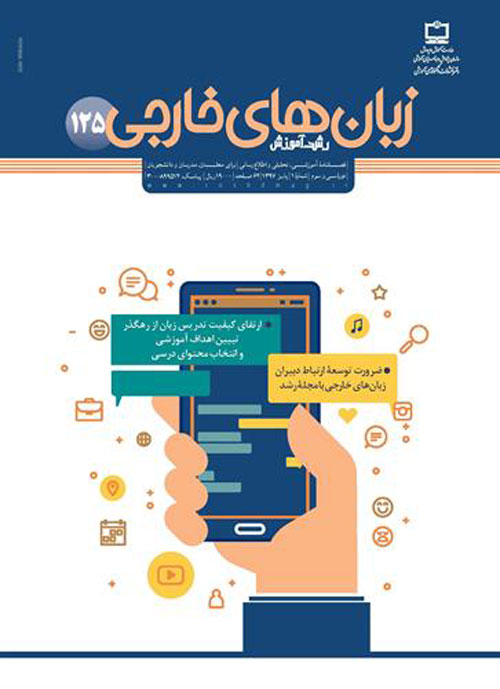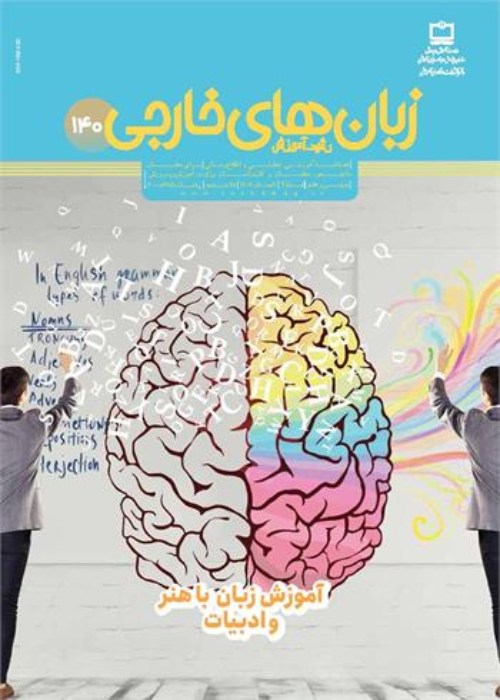فهرست مطالب

نشریه رشد آموزش زبان های خارجی
پیاپی 125 (پاییز 1397)
- تاریخ انتشار: 1397/08/20
- تعداد عناوین: 11
- یادداشت سردبیر
- رشد و تربیت معلم
-
صفحه 4
در مقاله پیشین (شماره 3 ،بهار 1397 ،ص4) به موارد و نکات متعددی که معلم زبان میبایست برای طراحی واحد آموزشی مدنظر قرار دهد اشاره کردیم و هر کدام را در دو محور مورد بررسی قرار دادیم. گفتیم که اولین گام برای طراحی واحد آموزشی تبیین اهداف آموزشی و انتخاب محتوای درسی است. براساس دیدگاه کوک (2003:242)واحد آموزشی مجموعهای از فعالیتهای آموزشی است که به شکل یکپارچه و هماهنگ در سلسلهای از مراحل گوناگون انجام میپذیرد. همچنین گفتیم که واحد آموزشی دربردارنده محتوای آموزشی است، از این رو آشنایی با واحد آموزشی برای معلم زبان بسیار مهم است. در حال 3 است، با این توضیح که اگرچه بهگزینی شیوهای مهم در حاضر آموزش زبان به تنوع نیاز دارد که یکی از مصادیق آن بهگزینی آموزش زبان است اما این امر، و بهطور کلی تنوع و گوناگونی فعالیتهای آموزشی و حق انتخاب این فعالیتهای گوناگون توسط معلم زبان، نباید او را از کتاب، روش آموزش و توجه به محتوای واحد آموزشی دور کند. در مقاله حاضر موضوع محتوای درسی و اهداف آموزشی را که در شکلگیری واحد آموزشی نقش مهمی دارند مورد بررسی قرار میدهیم.
کلیدواژگان: آموزش زبان خارجی، واحد آموزشی، اهداف آموزشی، محتوای درسی - گزارش
-
ضرورت توسعه ارتباط دبیران زبان های خارجی با مجله رشد / نشست سرگروه های آموزشی مناطق 19 گانه تهرانصفحه 7
-
Page 1Teaching is neither an innovation nor a fleeting vogue. It has been with human beings throughout history. Recently and in the wake of the revolution of new teaching methods and theories, competence of teachers in adopting the new methods has become appealing to many educational researchers. Eventually, it is maintained that taking part in teaching workshops and watching others’ teaching practice could be of a great help. Correspondingly, this study aimed at investigating student teachers’ attitudes towards teaching workshops and their effects on their competence in adopting the new methods. 40 student teachers who had some experience of attending such workshops were given questionnaires and to gain more in-depth data, semistructured interviews were conducted with ten of them. The findings of this study indicate that most of the student teachers had positive attitudes towards taking part in teaching workshops. Moreover they opine such workshops are effective and satisfactory. The findings of the present study leads us to the notion of necessity for teaching workshops as a supplement to the current internship course.Keywords: teaching workshop, internship, competence, student teacher, attitude
-
Page 12It is widely acknowledged that optimal learning in children takes place when they are motivated to discover and learn in a playful and relaxed atmosphere. The purpose of this action research was to investigate the role of teaching accompanied by motor activities in the English achievement of Iranian learners. A sample including 44 young language learners were placed into a control group and an experimental group. The learners in the control group were taught in the traditional way, but those in the experimental group were taught English accompanied by physical activities in a gym-like class and through playing roles and acting out. At the end, a written exam was administered to both groups and the results were analyzed. Results from this study showed that the treatment had a significant effect on learners’ achievement. This finding is discussed and some pedagogical implications are provided.Keywords: optimal learning, English language, physical activities, Iranian English learners
-
Page 17
-
Page 28
With the widespread and increased use of digital and online tools to facilitate learning, specifically language learning, there are mobile applications suitable for all needs and levels of proficiency. As reviewed in this paper, Improve English: Word Games developed by knudge.me is among the top-rated apps that is oriented towards vocabulary building with an eye to the reading and writing skills. This application is essentially based on scientific algorithms and gamification, incorporating micro-learning, spacing effect, and adaptive intelligence to satisfy the needs of modern-day learners. This review paper offers a descriptive account of the app, along with critical evaluation including its strong points and limitations. The review concludes with several suggestions to improve the educational quality of the app.
Keywords: technology, second language, mobile applications, word games -
Page 38
-
Page 41
Au cours de ces dernières années, l’usage des technologies de l’information et de la communication (TIC) dans l’enseignement/apprentissage des langues-cultures étrangères s’est considérablement développé en Iran. Les enseignants sont concernés par l’usage des outils propres aux TICE (technologies de l’information et de la communication pour l’enseignement) et leur intégration dans les pratiques pédagogiques. Les TICE permettent aux enseignants d’actualiser et d’enrichir non seulement les contenus de leurs enseignements, mais aussi de partager leurs expériences avec d’autres enseignants. Aussi, les TICE participent à la mise en place d’un espace de partage qui peut se prolonger en dehors des écoles. Ce qui introduit vers un enseignement/apprentissage interactif continu. Dans cette contribution, nous présenterons les enjeux didactiques d’une enquête menée dans une école privée à Téhéran, avec un espace numérique de travail accessible aux élèves et aux enseignantes. Cette enquête nous permettra de savoir si la pratique des TICE correspond aux besoins de nos élèves ainsi qu’aux attentes du processus didactique mis en place dans cet établissement. Aussi, nous allons essayer de comprendre quels sont les réseaux sociaux et les logiciels les plus utilisés par les enseignantes et les apprenants de français et quels seront les autres outils de TICE nécessaires à former les enseignantes.
Keywords: TICE, FLE, interactivité, didactisation, enseignant, apprenant -
Books / Normal 0 false false false EN-US X-NONE FAPage 49


